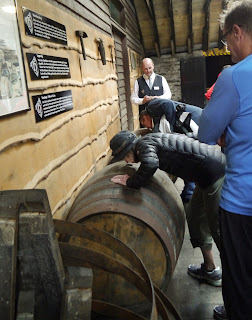Soon after arriving in Scotland in late August, Ann and my
The question of populist support for independence applies to lots of places. If self-determination is one of our values, if independence is OK for Kurdistan and Catalonia, why not for California? Imagine, hypothetically, that after ten or so more years of a Trumpian/Bannonite administration, northern Californians vote
Anyway, back to Scotland (a pretty good place to get back to.) We wandered about in northern Scotland’s Highlands, the Hebrides, the Orkneys, the moors and glens and lochs for over three weeks, never getting south of a line between Glasgow and Edinburgh. I can’t say we came to know the country, but we did come to admire and respect it – and even, after a couple of weeks, came occasionally to understand a few words and phrases.
Their country is wild and beautiful, and the Scots are proud, resourceful, canny, and fierce friends when called on. In every way, both subtle and direct, their message is that Scotland’s is a coherent culture, that Scotland has an identity and is a nation unto itself. Yes, since 1706/07 it has been joined in the United Kingdom: that’s what the term means, the unity of Scotland with England, Wales, and, at that time, Ireland under a single parliament and one royal family. But one gets the impression in their historical presentations and their discussions, in their pressure for federalism and devolution, that they regard themselves less a part of the United Kingdom and more as a “related kingdom.”
They voted down independence in 2014, 55% to 45%, but the driver was a strong affinity for the European Union and an assumption that, of course, the UK would remain in the EU. Scotland voted 62% - 38% against Brexit, to remain in the EU, the most lop-sided majority of any of the British “countries”. Several Scots we talked with said they felt “betrayed” by England’s vote to leave and overwhelmed (England has 53 million people; Scotland one tenth of that, 5.3 millions.) But the 2014 independence campaign and 2016 Brexit referendum were strains on Scotch comity and unity; several with whom we talked counseled to forego for now another referendum – too disruptive, too divisive. Better to wait and see how the Brexit negotiations play out and then put the question of independence again in four or five years.
There is little doubt our most of our few contacts would opt for independence rather than lose access to the European Union. Only one fellow, a grizzled, retired veteran of the Argyll and Sutherland Highlanders, expressed whole-hearted support for Union, i. e., the United Kingdom. Reacting to my question of what would Scotland do for a defense force in case of independence he, standing before a portrait of young Queen Elizabeth in regimental colors, blurted out “by the Grace of God, not!” But everyone else, the bartender, estate manager, game keeper, innkeeper, university student, foreign exchange student, immigrant and the rest strongly leaned toward independence. Clearly, young Scots see their futures linked to easy access to Europe. But all voiced the party line that better to wait than to rush into a new referendum.
These pictures don’t portray independence, that aspiration, that state of mind, but do show some of what endears us to Scotland. The north is a beautiful, austere land full of sheep and self-reliant souls. This time of year it is chill, squally, wet and wonderful – a land of rainbows; we learned there is no bad weather, only inappropriate clothes. We ate haggis with breakfast eggs and porridge served with cream, brown sugar and single-malt on the side (I’ll never eat oatmeal again any other way.) We wish the Scots well and independence, if that’s their wish, attained in a non-violent, civilized way of which both David Hume and Robert Burns would approve.















The colors are glorious; my painting instincts itched when looking at them! So glad it was a wonderful time and hope Ann's recovery proceeds apace. Love to you. PS our national refusal to understand independence leanings in others is so damned stupid, given our history -- Vietnam being the most tragic example for me.
ReplyDelete